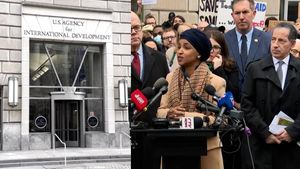Pierre Poilievre, the Conservative Leader of Canada, is calling for significant measures to bolster security at the Canada-U.S. border, responding to the growing tensions and tariff threats from U.S. President Donald Trump. Poilievre suggests sending Canadian Armed Forces troops and helicopters to assist with identifying and intercepting risks. Speaking on February 3, 2025, in Vancouver, he laid out his plans amid fears surrounding drug trafficking and illegal immigration, stating, "I've been calling to reinforce our border for about eight years now."
His recommendations also included hiring at least 2,000 border agents and extending the powers of the Canada Border Services Agency (CBSA) to cover the entire border, not just official entry points. This proposal follows months of contentious negotiations over Trump’s previously announced 25 percent tariffs on Canadian goods, which have been paused for now as Trudeau discussed border security enhancements.
The past few weeks have revealed increasing public sentiment against traveling to the U.S. due to dissatisfaction with Trump’s presidency. A new poll from Narrative Research indicates nearly two-thirds of Maritimers plan to reduce their travel to the United States, as many cite disagreements with Trump's leadership and policies. With 62% of respondents indicating they will boycott U.S. travel, it is clear the political climate is influencing individual decisions. Older Canadians, particularly those over 55, are the most likely cohort to curtail their trips, reflecting heightened anxiety over safety and economic uncertainty surrounding tariffs.
Poilievre reiterated the importance of adopting a "Canada first agenda" to mitigate perceived threats from U.S. policies. He believes securing the Canada-U.S. border is not only necessary for protection but also for establishing stronger self-reliance: "That is how we become stronger, more self-reliant, and less hopelessly dependent on foreign powers and foreign governments." The Conservative leader also urged the Liberal government to reconvene Parliament to push through his proposals, reflecting the urgency of the border issue.
Adding to the border security discussion is the recent decision by the CBSA to block northbound hikers on the Pacific Crest Trail from entering Canada. Previously, these thru-hikers had been allowed entry through permits, but now they must complete their hikes at specific border ports. The iconic Pacific Crest Trail spans nearly 2,700 miles, ending at the Canadian border, and those hiking northward are now forced to return rather than cross. This new restriction has generated dissatisfaction among outdoor enthusiasts and environmental conservationists.
The hiking community is particularly affected by the recent changes, as stated by the CBSA notice: "The Pacific Crest Trail permit program has ended. Anyone seeking to complete the Canadian portion of the trail must use a designated port of entry." Such changes signal the tightening grip of border control policies under the current political climate, alluding to greater scrutiny on international travel and transit.
These developments coincide with broader themes gripping Canadian society as the nation grapples with balancing border security and international relations with its southern neighbor. Trudeau's recent communication with Trump highlighted commitments to collaboratively combat organized crime and implement more efficient border control operations. Yet, this has raised debates within Canada concerning the ethos of national sovereignty and identity amid external pressures.
Overall, the border issue remains multifaceted and likely to evolve. With different factions advising various strategies—from military involvement to increased technological oversight—the situation reflects the interconnected nature of trade, security, and public sentiment. Canada stands at a crossroads, facing the challenges and opportunities presented by its proximity to the U.S., and the choices it makes now will play pivotal roles for its future.



